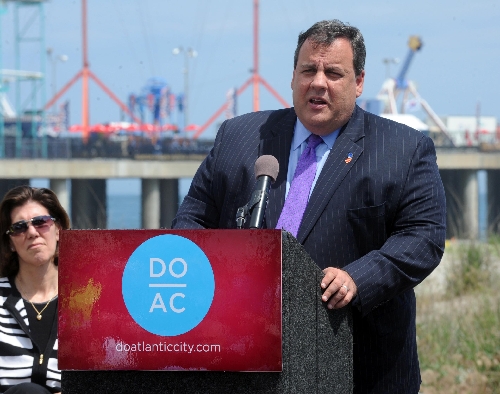New Jersey wagers that NFL, feds won’t block move to sports betting

Hard to fault New Jersey Gov. Chris Christie for following the time-honored tradition of politicians everywhere: When in doubt, give the people what they want.
Turns out what they really want in the Garden State is to be able to bet 100 bucks on the Jets in the sports book at the Meadowlands race track before strolling over to the stadium for the Sept. 9 home opener against Buffalo.
NFL commissioner Roger Goodell might shudder at the idea, but it could happen. Probably not this season as Christie hopes, but it’s entirely conceivable that by the time the Super Bowl comes to the New York metropolitan area in 2014, it will be easy to place a wager on your favorite team at the race track next door.
That’s a sobering thought for a league so paranoid about sports betting that for years it forbade Las Vegas from even being mentioned during games. But Christie’s decision to defy a federal law against sports betting in all but four states is an exciting thought for New Jersey residents, who voted by a 2-1 margin last year in favor of sports books in Atlantic City casinos and four major racetracks.
“We intend to go forward,” Christie said Thursday. “If someone wants to stop us, then let them try to stop us.”
The federal government will almost certainly take Christie up on that challenge. So, too, likely will the NFL, which views betting on games with the same kind of antiquated logic it used to trot out every time the issue of concussions came up.
But times have changed, as was evident last season when Las Vegas casino owner Steve Wynn was Patriots owner Robert Kraft’s personal guest at a game, where the two went over plans to build a lavish casino next to the stadium where New England plays. The league has also branched off into other forms of gambling, including partnerships with state lotteries that make team owners millions of dollars from people who can least afford to lose it.
Feel free to throw your money away on Patriots scratch cards that are almost always sure losers. Play the slots in casinos built on team-owned land.
But don’t even think about trying to add some enjoyment to a game by betting on your team to win.
“I don’t think it is in the best interest of the NFL to have any association with sports betting,” Goodell said at the 2007 Super Bowl.
It’s the ultimate in hypocrisy, of course, though hardly surprising. The NFL – which had at least one bookmaker among its founding owners – has taken a harsh stand against sports betting for a good half-century now, even while the reasons to justify its opposition have largely vanished.
The main fear was always that unsavory types would hang around players, and that the fix might be in. But any gambler will tell you it’s almost impossible to try to fix any game when bets are made through legal sports books who constantly monitor any swing in the action.
“Right now over 99 percent of sports betting is unregulated and untaxed. It’s a market dominated by criminals,” said Joe Asher, CEO of the company that runs 17 Lucky’s sports books. “There’s no way you’re going to stop an illegal sports betting market from thriving other than to legalize it.”
Legalizing sports betting wouldn’t turn it into a billion-dollar business because it already is that – and much more. What it would do is take the business out of the hands of illegal bookmakers who thrive in most major cities and away from the offshore online sports books that operate without any government regulation.
All but two states already have some form of gambling, so it’s no longer a social issue. And, let’s face it, people love to bet sports.
“It’s part of the American culture, it’s why we watch sports,” Asher said. “Creating a legal market for sports betting so that it is regulated, so that it is taxed, and so that legitimate businesses are involved is, of course, a good thing. The sooner that happens, the better for everyone involved.”
Christie might have helped make it happen sooner in a bold move predicated on the belief that a 1992 law that limits sports betting to four states ultimately will not hold up in court. He wants sports betting in New Jersey by this fall, and he’s practically daring the federal government and the major sports leagues to try to stop it.
It’s not going to happen as quickly as Christie wants, and it might not save Atlantic City or the state’s horse racing industry by itself. But he’s the first major politician to come out aggressively favoring sports betting, and he doesn’t seem to be afraid of taking on the NFL or the federal government to get it done.
That’s a good thing, because there should be nothing criminal about making a bet. Wall Street traders do the same thing every day, only they’re betting on companies instead of teams.
Take the business out of back rooms and street corners. Legitimize it like in England, where there are betting shops on almost every block and even the stadiums have betting kiosks for fan convenience.
Opposition will be fierce, and there’s still a long way to go. But I’m laying 7-5 it just might happen.
Tim Dahlberg is a Las Vegas-based national sports columnist for The Associated Press. Write to him at tdahlberg@ap.org or http://twitter.com/timdahlberg.












